Yoga holistic health combines physical, mental, and spiritual practices to enhance your overall well-being. It fosters a deeper connection between your body and mind, reduces stress, and promotes emotional resilience. Through various yoga styles and meditation, you'll improve flexibility, boost cardiovascular health, and cultivate mindfulness. This integrated approach supports your journey towards improved health and self-awareness. Discover how to incorporate these practices into your daily life for lasting wellness and transformative benefits.
Key Takeaways
- Yoga holistic health emphasizes the interconnectedness of physical, mental, and spiritual well-being for overall health improvement.
- It integrates physical postures, mindfulness meditation, and self-awareness practices to enhance emotional resilience and reduce stress.
- Regular yoga practice improves flexibility, cardiovascular health, and respiratory function while promoting relaxation and lowering blood pressure.
- Different yoga styles cater to individual needs, addressing specific health concerns and promoting overall wellness through tailored practices.
- Incorporating yoga into daily life fosters healthier choices, enhances sleep quality, and supports a positive outlook on life.
Understanding Holistic Health and Its Importance

Understanding holistic health is essential because it emphasizes the interconnectedness of your physical, mental, and spiritual well-being. This approach recognizes that each aspect impacts your overall health, creating a balance that supports emotional resilience and stress reduction.
By practicing holistic health, you cultivate self-awareness and mindfulness, which lead to better decision-making in daily life. You might find that incorporating activities like yoga enhances this mind-body connection, offering significant health benefits.
With yoga, you engage in physical and mental practices that improve sleep quality and support preventive care. As you integrate these elements into your routine, you'll notice a positive shift in your quality of life, enabling you to tackle chronic diseases and promote lasting wellness.
The Role of Yoga in Holistic Health
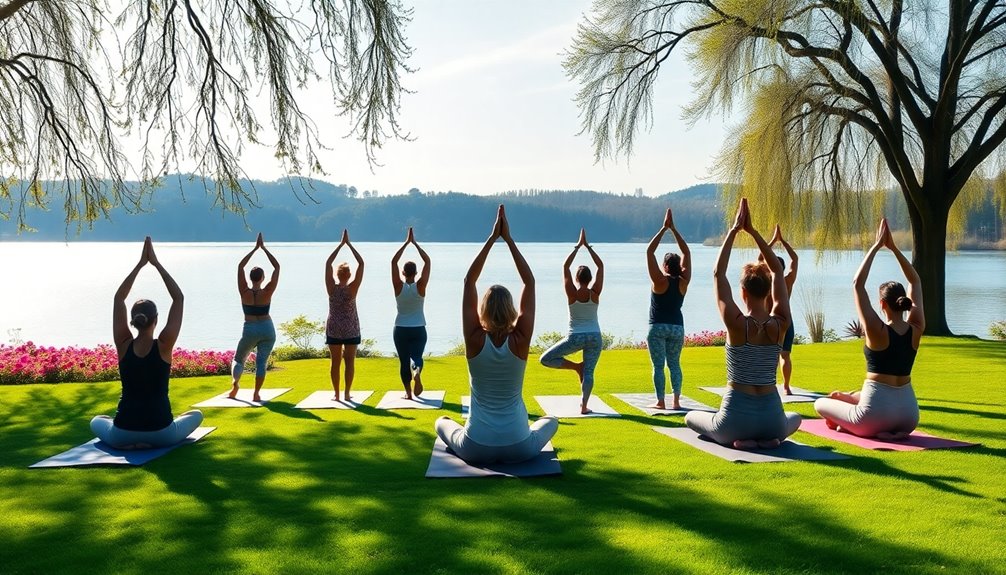
Yoga plays a significant role in holistic health by seamlessly integrating physical, mental, and spiritual practices. Through various postures and breathing techniques, you can enhance your physical health, improve flexibility, and promote cardiovascular well-being. Additionally, yoga supports mental health by reducing stress and anxiety while fostering mindfulness meditation skills that boost emotional resilience.
| Aspect | Benefits | Techniques |
|---|---|---|
| Physical Health | Increases strength and balance | Asanas, Breathing |
| Mental Health | Reduces anxiety and improves mood | Mindfulness Meditation |
| Spiritual Growth | Fosters self-awareness | Meditation, Reflection |
| Stress Response | Lowers cortisol levels | Breathing Techniques |
| Overall Quality of Life | Promotes healthy aging | Holistic Practices |
Benefits of Combining Yoga and Meditation
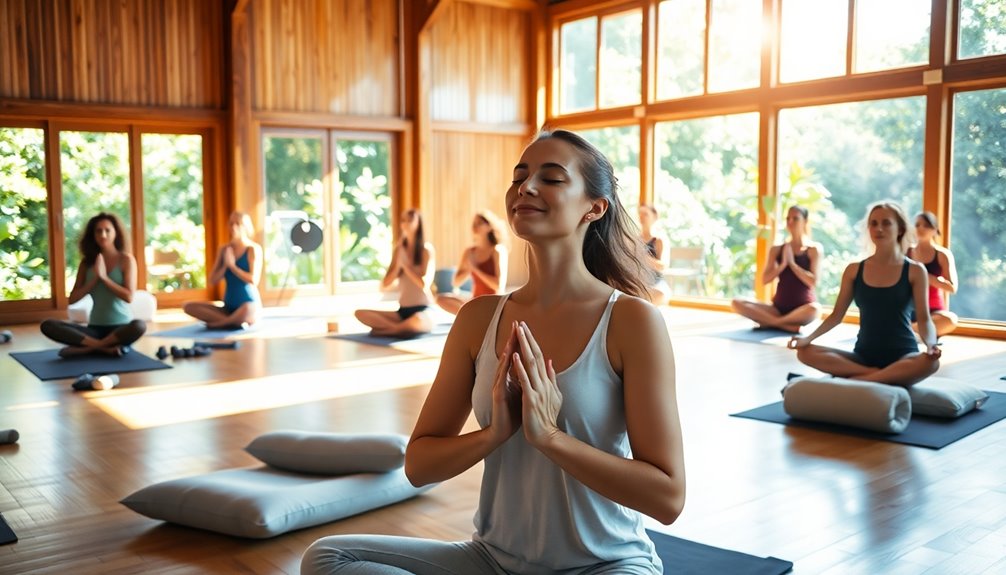
When you combine yoga and meditation, you strengthen your mind-body connection, allowing for a deeper awareness of your physical and emotional states.
This synergy also equips you with effective stress reduction techniques that can help you navigate daily challenges more easily.
Enhanced Mind-Body Connection
The synergy of yoga and meditation creates a powerful pathway to enhance your mind-body connection.
By incorporating breathing exercises into your regular practice, you cultivate body awareness and improve mental well-being. This holistic approach not only reduces stress levels but also fosters emotional resilience, allowing you to navigate life's challenges more effectively.
When you engage in both practices, you increase blood flow to the brain, which enhances cognitive function and mental clarity.
Furthermore, the integration of yoga and meditation helps lower your heart rate and blood pressure, promoting overall physical relaxation.
Studies show that individuals who practice both report a heightened sense of connection to their bodies and emotions, leading to a more fulfilling and balanced life.
Stress Reduction Techniques
Integrating yoga and meditation offers effective stress reduction techniques that can transform your daily life.
By practicing yoga regularly, you'll experience improved physical relaxation and tension release, while mindfulness meditation enhances your present-moment awareness. This combination markedly lowers cortisol levels, reducing stress and anxiety, and boosting your emotional resilience.
Controlled breathing techniques activate your parasympathetic nervous system, further aiding in reducing stress. Regularly engaging in both practices not only improves your sleep quality but also enhances your overall well-being.
You'll likely notice a notable reduction in perceived stress levels and an increase in life satisfaction. Embracing these techniques will provide you with essential health benefits, creating a balanced state of mind and body.
Physical Health Advantages of Yoga
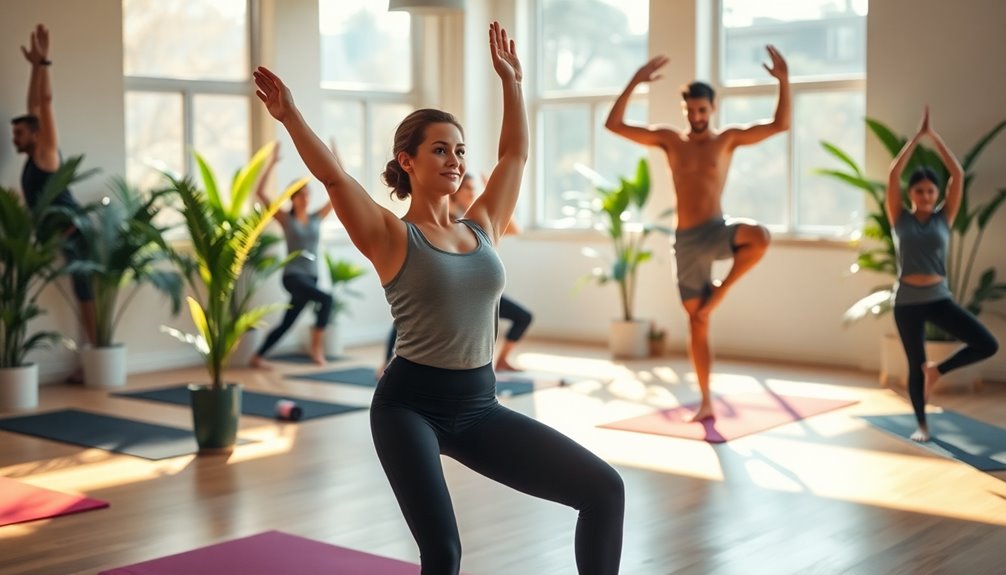
How can yoga transform your physical health? When you practice yoga, you'll discover numerous benefits that enhance your overall well-being.
One key advantage is improved flexibility, which reduces your risk of injuries by systematically stretching and strengthening your muscles.
Additionally, regular yoga practice can greatly boost your cardiovascular health by lowering blood pressure and promoting better circulation.
You'll also notice enhanced respiratory function through controlled breathing techniques, leading to increased lung capacity.
For those dealing with chronic conditions like arthritis or back pain, yoga offers therapeutic movements that provide relief.
Finally, engaging in yoga regularly can boost your energy levels, helping you feel more essential and perform better in daily activities. Incorporating regular physical activity can further enhance the benefits of yoga for your overall health.
Embrace yoga for a healthier, happier you!
Mental Health Benefits of Yoga Practice
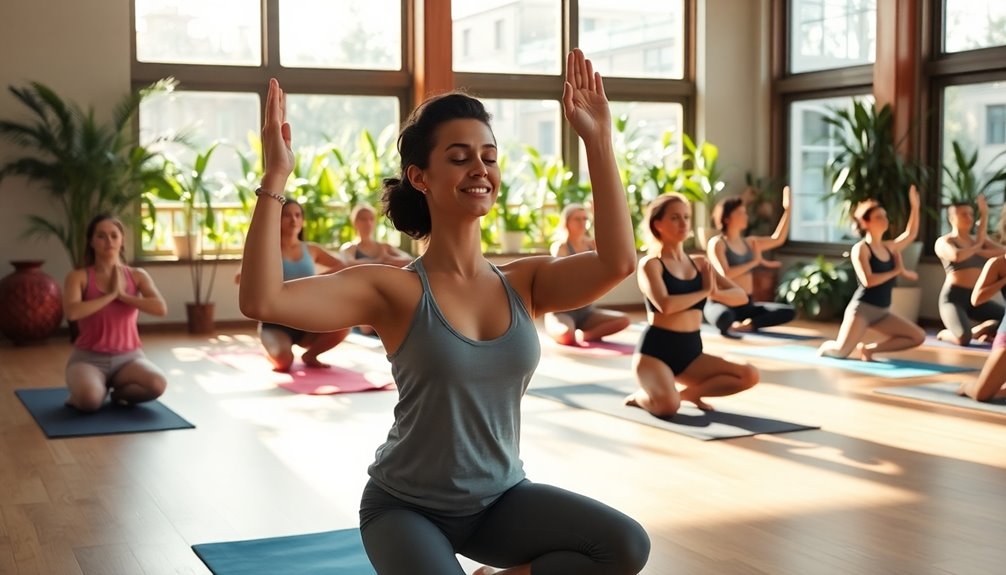
Yoga isn't just about physical health; it's a powerful tool for enhancing your mental well-being too.
By practicing stress reduction techniques, you can build emotional resilience and boost your cognitive function.
Let's explore how these benefits can transform your mental health.
Stress Reduction Techniques
While many people face daily stressors, incorporating yoga into your routine can serve as a powerful tool for stress reduction.
Through controlled breathing techniques, or pranayama, yoga practice activates your parasympathetic nervous system, leading to relaxation and reduced stress levels.
Mindfulness meditation, often part of yoga, decreases cortisol, the stress hormone, enhancing your overall well-being.
Regular practice can notably lower symptoms of anxiety and depression, with participants experiencing a 30-50% reduction in anxiety levels.
The combination of physical postures and meditation fosters emotional resilience, helping you manage stress and recover from challenges.
Additionally, improved sleep quality from consistent yoga practice is closely linked to lower stress and better mental clarity, promoting a balanced, healthier life.
Enhanced Cognitive Function
When you incorporate yoga into your routine, you not only nurture your body but also enhance your cognitive function.
Regular yoga practice increases hippocampus size, improving memory and mental clarity. It promotes neuroplasticity, fostering new neural connections that boost learning and adaptability.
With mindfulness meditation as a key component, you'll notice enhanced focus and concentration, leading to better performance in cognitive tasks.
The combination of controlled breathing techniques and physical postures increases blood flow to the brain, sharpening your mental performance.
Additionally, yoga helps reduce stress and symptoms of anxiety and depression, which positively impacts overall cognitive function. Engaging in practices like yoga can also help individuals recover from the emotional toll of narcissistic relationships, fostering resilience and clarity.
Embrace yoga to release your brain's potential and experience these mental health benefits today.
Emotional Resilience Development
Embracing yoga as a regular practice not only benefits your physical health but also greatly enhances your emotional resilience.
By fostering mindfulness, yoga helps you manage stress more effectively, allowing for better emotional regulation. Techniques like pranayama reduce cortisol levels, promoting a calmer mental state. Regular practitioners often report heightened emotional stability and lower depression rates.
Engaging in yoga initiates neuroplastic changes in your brain, improving your ability to cope with challenges. Additionally, the integration of meditation enhances present-moment awareness, helping you break free from negative thought patterns.
As you deepen your practice, you'll find that your emotional resilience strengthens, equipping you to navigate life's ups and downs with greater ease and confidence.
Spiritual Growth Through Yoga

Yoga serves as a powerful tool for spiritual growth, as it combines practices like meditation and mindfulness that deepen your self-awareness.
Through meditation, you cultivate positive thinking and strengthen your emotional connection to your inner self. This journey fosters spiritual health, allowing you to experience a calm and content state of being.
Regular practice encourages compassion and empathy, enhancing your connection with others and the world around you. Mindfulness helps you remain present, enabling you to fully experience each moment.
As you engage in chanting and mantra repetition, you align your spirit, creating a peaceful mindset essential for spiritual growth.
Embrace these practices, and watch your understanding of yourself and your relationship with the universe expand.
Different Yoga Styles for Holistic Well-Being
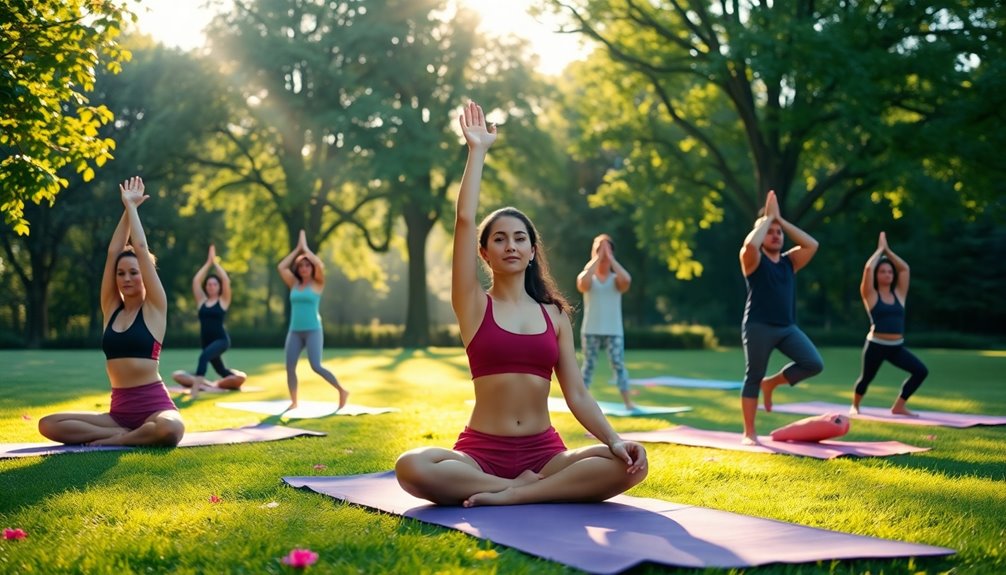
Exploring the various styles of yoga can greatly enhance your holistic well-being. Each style offers unique benefits for your physical and emotional health. Here's a quick overview:
| Yoga Style | Benefits |
|---|---|
| Gentle Yoga | Improves flexibility, ideal for managing stress and relaxation. |
| Hatha Yoga | Strengthens the body, enhances mindfulness. |
| Vinyasa Yoga | Increases cardiovascular endurance and mental clarity. |
Choosing different yoga styles can address specific health concerns and improve your overall well-being. Whether you prefer the restorative nature of Gentle Yoga or the dynamic flow of Vinyasa, you'll cultivate a positive outlook while enhancing both physical and emotional stability. Embrace these practices to foster a balanced lifestyle.
Scientific Evidence Supporting Yoga's Effectiveness

While many people may view yoga as just a physical practice, scientific evidence reveals its profound effects on both physical and mental health.
Regular yoga practice enhances physical health by improving the immune system and reducing inflammation markers. Additionally, studies show that yoga considerably boosts mental health, with participants experiencing decreased anxiety and depression levels.
This holistic approach fosters emotional well-being through enhanced metacognition, resilience, and self-regulation. You'll also find that yoga enhances overall well-being, improving quality of life and social connections.
It's recognized as a cost-effective adjunct treatment in various health settings, promoting self-efficacy and encouraging lasting behavioral changes. Embracing yoga can be a powerful tool for stress management and holistic health.
Integrating Yoga Into Daily Life for Lasting Wellness

The benefits of yoga extend far beyond the mat, making it a valuable addition to your daily routine. By integrating regular yoga practice, you can enhance your flexibility, strength, and overall wellness.
This consistent practice fosters emotional resilience and reduces stress, essential components for maintaining a balanced lifestyle. Incorporating breathwork, or pranayama, into your day can promote relaxation and improve respiratory function, positively impacting your mental and physical health.
Additionally, the mindfulness developed through yoga encourages present-moment awareness, guiding you toward healthier choices. Engaging in daily yoga can also enhance sleep quality and regulate circadian rhythms, supporting better overall health and longevity. Practicing deep breathing techniques can further aid in reducing tension and stress, enhancing your overall well-being.
Embrace these benefits to cultivate lasting wellness in your life.
Frequently Asked Questions
What Is the Concept of Holistic Health?
Holistic health means seeing you as a whole person, where your physical, mental, and spiritual well-being are interconnected.
It recognizes that everything in your life—from your diet to your relationships—affects your overall health.
Instead of just treating symptoms, you focus on the root causes of issues.
What Is Holistic Yoga Therapy?
Holistic yoga therapy combines physical postures, breathwork, and meditation to enhance your overall well-being.
It focuses on your unique needs, helping you heal from chronic conditions while boosting emotional resilience.
As you practice regularly, you'll notice reduced stress and anxiety, improved mental health, and greater self-awareness.
This approach not only strengthens your body but also supports emotional balance, making it a powerful tool for personal growth and recovery.
What Is the Role of Yoga in Holistic Development?
Imagine a tree, its roots deep in the earth, branches reaching for the sky.
That's you practicing yoga in holistic development. You strengthen your roots—your body—through postures, while your branches—your mind and spirit—expand with breathwork and meditation.
This balance nurtures emotional resilience and self-awareness. As you cultivate mindfulness, stress fades, allowing you to connect deeply with yourself and others, creating a flourishing life, grounded and full of growth.
What Are the 5 Steps of a Holistic Approach?
To embrace a holistic approach, you can follow five key steps.
First, cultivate self-awareness by evaluating your current health and identifying areas for improvement.
Next, develop a personalized plan with specific, achievable goals that include physical activity, mindful eating, and stress management.
After that, implement your plan consistently.
Remember to regularly assess your progress and make adjustments as needed.
Finally, engage with supportive practices to guarantee long-term well-being and balance.
Conclusion
As you roll out your yoga mat, feel the weight of the world lift off your shoulders. Each deep breath you take invites clarity and calmness, weaving together your body, mind, and spirit. Embracing yoga in your life isn't just about poses; it's about nurturing a holistic sense of well-being. Picture yourself blossoming like a vibrant flower, rooted in health and radiating peace, as you begin this transformative journey toward lasting wellness and harmony.









